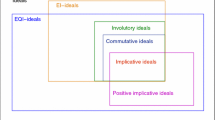Abstract
We define the Boolean center and the Boolean skeleton of a bounded BCK-algebra, and we use the Boolean skeleton to obtain a representation of bounded BCK-algebras, called (weak) Pierce \(b\mathbb{BCK}\)-representation, as (weak) Boolean products of bounded BCK-algebras. We analyze the cases in which the stalks in these representations are directly indecomposable, finitely subdirectly irreducible or simple algebras. We give some examples of algebras and relative subvarieties of bounded BCK-algebras to illustrate the results.
Similar content being viewed by others
References
Bigelow D and Burris S (1990). Boolean algebras of factor congruences. Acta Sci Math 54: 11–20
Blok WJ, Pigozzi D (1989) Algebraizable logics. Mem Am Math Soc 77(396) vii + 78 pp
Blok W and Raftery JG (1995). On the quasivariety of BCK-algebras and its subvarieties. Algebra Universalis 33: 68–90
Brown DJ and Suszko R (1973). Abstract logics. Diss Math 102: 4–42
Burris S and Sankappanavar HP (1981). A course in Universal algebra. Graduate text in Math, vol 78. Springer, New York
Burris S and Werner H (1979). Sheaf constructions and their elementary properties. Trans Am Math Soc 248: 269–309
Busaniche M (2003). Free algebras in varieties of BL-algebras generated by a chain. Algebra Universalis 50(3–4): 259–277
Busaniche M and Cignoli R (2006). Free algebras in varieties of BL-algebras generated by a BLn-chain. J Aust Math Soc 80(3): 419–439
Cignoli R and Torrens A (1996). Boolean products of MV-algebras: hypernormal MV-algebras. J Math Anal Appl 99: 637–653
Cignoli R and Torrens A (2002). Free algebras in varieties of BL-algebras with a Boolean retract. Algebra Universalis 48(1): 55–79
Cignoli R and Torrens A (2004). Glivenko like theorems in natural expansions of BCK-logics. Math Log Quart 50(2): 111–125
Cignoli R and Torrens A (2006). Free algebras in varieties of Glivenko MTL-algebras satisfying the equation 2(x 2) = (2x)2. Stud Log 83: 157–181
Cintula P, Hájek P, Horcik R (2007) Fragments of some prominent fuzzy logics. Manuscript (submitted)
Di Nola A, Georgescu G and Leustean L (2000). Boolean products of BL-algebras. J Math Anal Appl 251(1): 106–131
Dziobiak W (1989). Finitely generated congruence distributive quasivarieties of algebras. Fundam Math 133: 47–57
Font JM, Rodriguez AJ, Torrens A (1984) Wajsberg algebras. Stochastica 8:5–31
García FM and Rodriguez AJ (2000). Linearization of BCK-logic. Stud Log 65: 31–51
Gispert J and Torrens A (2007). Bounded BCK-algebras and their generated variety. Math Log Q 53: 206–213
Grišin VN (1982). Predicate and set-theoretical calculi based on logic without contractions. Math USSR Izv 18: 41–59
Grišin VN (1985). Impossibility of defining the class of L 0-algebras by means of identities. Math Notes 38: 861–867
Iseki K (1966). An algebra related with a propositional calculus. Poc Jpn Acad 42: 26–29
Iseki K (1976) On bounded BCK-algebras. Math Sem Notes Kobe Univ 3:23–33 (see also pp 34–36)
Iseky K and Tanaka S (1978). An introduction to the theory of BCK-algebras. Math Jpn Acad 23: 1–26
Krauss HP, Clark DM (1979) Global subdirect products. Mem Amer Math Soc 210
Pałasińska K (1987). Amalgamation property in some classes of BCK-algebras. Rep Math Log 21: 72–84
Pałasiński M (1980). Some remarks on BCK-algebras. Math Semmin Notes Kobe Univ 8: 137–144
Pałasiński M (1981). On ideal, congruence lattices of BCK-algebras. Math Jpn 26: 543–544
Rasiowa H (1974). An algebraic approach to non-classical logics. North Holland, Amsterdam
Swamy UM and Suryanarayana G (1981). Murti Boolean centre of universal algebra. Algebra Universalis 13: 202–205
Torrens A (1987). W-algebras which are Boolean products of members of SR[1] and CW-algebras. Stud Log 44: 265–274
Vaggione D (2000). Characterization of discriminator varieties. Proc Am Math Soc 129: 663–666
Wroński A (1983a). BCK algebras do not form a variety. Math Jpn 28: 211–213
Wroński A (1983b). Reflections and Distentiones of BCK algebras. Math Jpn 28: 215–225
Author information
Authors and Affiliations
Corresponding author
Rights and permissions
About this article
Cite this article
Gispert, J., Torrens, A. Boolean representation of bounded BCK-algebras. Soft Comput 12, 941–954 (2008). https://doi.org/10.1007/s00500-007-0261-0
Published:
Issue Date:
DOI: https://doi.org/10.1007/s00500-007-0261-0




